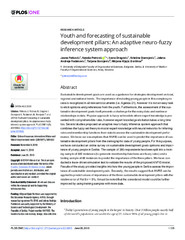Please use this identifier to cite or link to this item:
https://rfos.fon.bg.ac.rs/handle/123456789/1958Full metadata record
| DC Field | Value | Language |
|---|---|---|
| dc.creator | Petković, Jasna | - |
| dc.creator | Petrović, Nataša | - |
| dc.creator | Dragović, Ivana | - |
| dc.creator | Stanojević, Kristina | - |
| dc.creator | Radaković, Jelena Andreja | - |
| dc.creator | Borojević, Tatjana | - |
| dc.creator | Kljajic-Borstnar, Mirjana | - |
| dc.date.accessioned | 2023-05-12T11:22:48Z | - |
| dc.date.available | 2023-05-12T11:22:48Z | - |
| dc.date.issued | 2019 | - |
| dc.identifier.issn | 1932-6203 | - |
| dc.identifier.uri | https://rfos.fon.bg.ac.rs/handle/123456789/1958 | - |
| dc.description.abstract | Sustainable development goals are used as a guidance for strategies development on local, regional and national levels. The importance of including young people in this complex process is recognized in all relevant documents (i.e. Agenda 21), however it is not an easy task to elicit opinions and preferences from the youth. Furthermore, the assessment of the sustainable development goals itself presents a challenge for the noisy data and nonlinear relationships in data. Popular approach is fuzzy set models where expert knowledge is presented with comprehensible rules; however expert knowledge elicitation takes a long time too. Several studies proposed an adaptive neuro-fuzzy inference system approach that combines the fuzzy set theory to model expert knowledge with neural networks for inferring rules and membership functions from data to assess the sustainable development performance. We base our assumptions that ANFIS can be used to predict the importance of sustainable development pillars from the demographic data of young people. For this purpose, we have conducted an online survey on sustainable development goals opinions and importance of young people in Serbia. The sample of 386 respondents has been split into a training sample of 300 instances (to generate membership functions and fuzzy rules) and a testing sample of 86 instances to predict the importance of the three pillars. We have conducted a trace-driven simulation test to validate the results of the proposed ANFIS model. Results of the study provided insights into how the young people in Serbia assess the importance of sustainable development goals. Secondly, the results suggest that ANFIS can be applied to predict values of importance of the three sustainable development pillars with the relative error of Rel Err LT 5%. It must be noted that the considered model could be further improved by using training samples with more data. | en |
| dc.publisher | Public Library Science, San Francisco | - |
| dc.relation | Slovenian Research Agency, ARRS [P5-0018] | - |
| dc.relation | info:eu-repo/grantAgreement/MESTD/Integrated and Interdisciplinary Research (IIR or III)/47003/RS// | - |
| dc.rights | openAccess | - |
| dc.rights.uri | https://creativecommons.org/licenses/by/4.0/ | - |
| dc.source | PLoS One | - |
| dc.title | Youth and forecasting of sustainable development pillars: An adaptive neuro-fuzzy inference system approach | en |
| dc.type | article | - |
| dc.rights.license | BY | - |
| dc.citation.issue | 6 | - |
| dc.citation.other | 14(6): - | - |
| dc.citation.rank | M22 | - |
| dc.citation.volume | 14 | - |
| dc.identifier.doi | 10.1371/journal.pone.0218855 | - |
| dc.identifier.fulltext | http://prototype2.rcub.bg.ac.rs/bitstream/id/583/1954.pdf | - |
| dc.identifier.pmid | 31237924 | - |
| dc.identifier.rcub | conv_2216 | - |
| dc.identifier.scopus | 2-s2.0-85068865363 | - |
| dc.identifier.wos | 000484856000046 | - |
| dc.type.version | publishedVersion | - |
| item.cerifentitytype | Publications | - |
| item.fulltext | With Fulltext | - |
| item.grantfulltext | open | - |
| item.openairecristype | http://purl.org/coar/resource_type/c_18cf | - |
| item.openairetype | article | - |
| Appears in Collections: | Radovi istraživača / Researchers’ publications | |
SCOPUSTM
Citations
7
checked on Dec 14, 2025
Page view(s)
20
checked on Dec 28, 2025
Download(s)
8
checked on Dec 28, 2025
Google ScholarTM
Check
Altmetric
This item is licensed under a Creative Commons License


